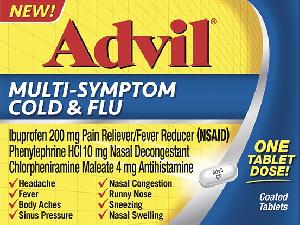Advil Multi-Symptom Cold & Flu Interactions
There are 837 drugs known to interact with Advil Multi-Symptom Cold & Flu (chlorpheniramine / ibuprofen / phenylephrine), along with 19 disease interactions, and 2 alcohol/food interactions. Of the total drug interactions, 137 are major, 686 are moderate, and 14 are minor.
- View all 837 medications that may interact with Advil Multi-Symptom Cold & Flu
- View Advil Multi-Symptom Cold & Flu alcohol/food interactions (2)
- View Advil Multi-Symptom Cold & Flu disease interactions (19)
Most frequently checked interactions
View interaction reports for Advil Multi-Symptom Cold & Flu (chlorpheniramine / ibuprofen / phenylephrine) and the medicines listed below.
- Advil (ibuprofen)
- Advil Cold and Sinus (ibuprofen / pseudoephedrine)
- albuterol
- Aleve (naproxen)
- Ambien (zolpidem)
- amitriptyline
- amoxicillin
- aspirin
- azithromycin
- Benadryl (diphenhydramine)
- benzonatate
- biotin
- bupropion
- cyclobenzaprine
- doxycycline
- famotidine
- Flexeril (cyclobenzaprine)
- fluticasone nasal
- gabapentin
- ibuprofen
- Keflex (cephalexin)
- levothyroxine
- meloxicam
- naproxen
- omeprazole
- prednisone
- Tylenol (acetaminophen)
- Vitamin B12 (cyanocobalamin)
- Vitamin D3 (cholecalciferol)
- Zyrtec (cetirizine)
Advil Multi-Symptom Cold & Flu alcohol/food interactions
There are 2 alcohol/food interactions with Advil Multi-Symptom Cold & Flu (chlorpheniramine / ibuprofen / phenylephrine).
Advil Multi-Symptom Cold & Flu disease interactions
There are 19 disease interactions with Advil Multi-Symptom Cold & Flu (chlorpheniramine / ibuprofen / phenylephrine) which include:
- asthma
- fluid retention
- GI toxicity
- rash
- renal toxicities
- thrombosis
- cardiovascular disease
- anticholinergic effects
- asthma/COPD
- cardiovascular
- renal/liver disease
- PKU
- anemia
- hepatotoxicity
- hyperkalemia
- platelet aggregation inhibition
- BPH
- diabetes
- glaucoma
More about Advil Multi-Symptom Cold & Flu (chlorpheniramine / ibuprofen / phenylephrine)
- Compare alternatives
- Pricing & coupons
- Drug images
- Side effects
- Drug class: upper respiratory combinations
Related treatment guides
Drug Interaction Classification
| Highly clinically significant. Avoid combinations; the risk of the interaction outweighs the benefit. | |
| Moderately clinically significant. Usually avoid combinations; use it only under special circumstances. | |
| Minimally clinically significant. Minimize risk; assess risk and consider an alternative drug, take steps to circumvent the interaction risk and/or institute a monitoring plan. | |
| No interaction information available. |
Further information
Always consult your healthcare provider to ensure the information displayed on this page applies to your personal circumstances.


